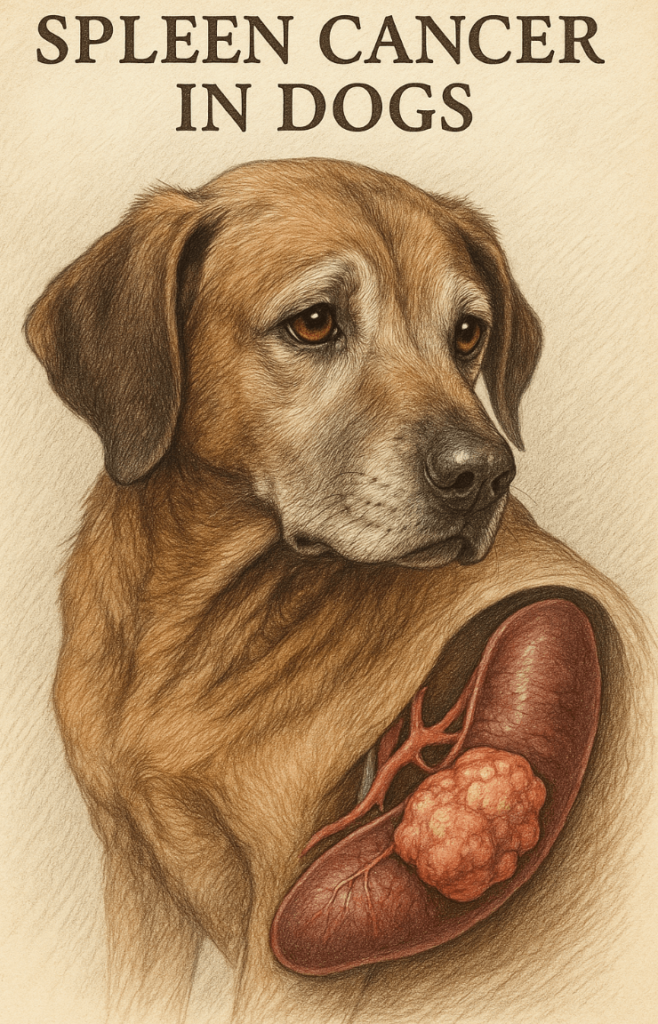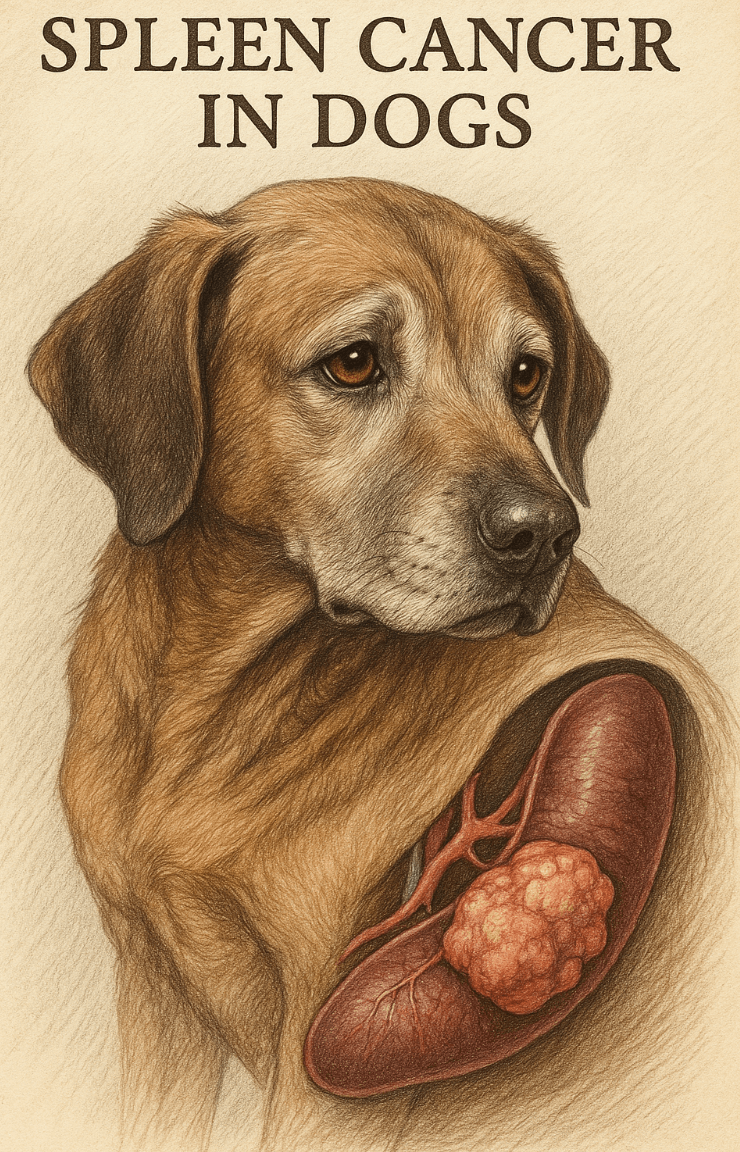Spleen Cancer in Dogs: Understanding the Condition and How to Help Your Furry Friend
Spleen cancer in dogs is a serious and often life-threatening condition that can affect our beloved companions. The spleen, an organ responsible for filtering blood, storing red blood cells, and supporting the immune system, can develop tumors that may be benign or malignant.
Unfortunately, many cases of spleen cancer are diagnosed late due to subtle symptoms, making early detection and treatment critical. As a dog owner, understanding the signs, causes, and available treatment options can make all the difference in providing your pet with the best possible care. In this blog post, we’ll explore everything you need to know about spleen cancer in dogs, from diagnosis to managing their quality of life.
Common Symptoms of Spleen Cancer in Dogs
Recognizing the symptoms of spleen cancer early can significantly improve your dog’s prognosis. While some signs may seem mild at first, they should never be ignored. Here are the most common indicators to watch for:
Abdominal Swelling:
One of the hallmark signs of spleen cancer is a distended abdomen caused by internal bleeding or tumor growth.Lethargy and Weakness:
Dogs with spleen cancer often appear unusually tired or reluctant to engage in physical activities they once enjoyed.Loss of Appetite:
A sudden decrease in appetite can signal discomfort or illness, including spleen-related issues.Pale Gums:
Pale or white gums may indicate anemia, often caused by internal bleeding associated with splenic tumors.Collapse or Fainting Episodes:
Severe cases of spleen cancer can lead to fainting spells due to significant blood loss or shock.
If you notice any of these symptoms, it’s crucial to consult your veterinarian immediately. Early intervention can make a significant difference in your dog’s outcome.
Causes and Risk Factors for Spleen Cancer in Dogs
While the exact cause of spleen cancer in dogs isn’t always clear, certain factors can increase the risk of developing this condition. Understanding these risks can help you take preventive measures and monitor your dog’s health more closely.
Age and Breed Predisposition:
Older dogs, particularly large breeds like German Shepherds, Golden Retrievers, and Labrador Retrievers, are more prone to spleen cancer.Genetic Factors:
Some dogs may inherit a predisposition to developing tumors, highlighting the importance of understanding your dog’s lineage.Previous Health Issues:
Dogs with a history of immune disorders or chronic inflammation may face a higher risk of developing cancerous growths.Environmental Toxins:
Exposure to pesticides, herbicides, or other harmful chemicals can contribute to the development of cancer over time.Lack of Regular Veterinary Check-Ups:
Skipping routine vet visits can delay the detection of potential health problems, including spleen cancer.
By addressing these risk factors proactively, you can reduce the likelihood of your dog developing spleen cancer or catch it early if it does occur.
Check this guide 👉Understanding Dog Spleen Tumor Ultrasound: Best 7 Tips!
Check this guide 👉Understanding the Dog Spleen: Best 7 Expert Tips!
Check this guide 👉Types of Dog Tumors: Best 7 Expert Tips!

Symptoms of Spleen Cancer in Dogs | Steps to Take If You Suspect Spleen Cancer |
|---|---|
Abdominal swelling | Schedule an immediate vet appointment |
Lethargy and weakness | Monitor your dog’s energy levels daily |
Loss of appetite | Offer bland, easily digestible food |
Pale gums | Check gums regularly for color changes |
Collapse or fainting episodes | Keep your dog calm and seek emergency care |
Diagnosis and Treatment Options for Spleen Cancer in Dogs
Diagnosing and treating spleen cancer requires a comprehensive approach involving veterinary expertise and advanced medical interventions. Here’s what you can expect during the process:
Diagnostic Tests:
Blood work, ultrasounds, and X-rays are commonly used to identify abnormalities in the spleen and surrounding organs.Biopsy Procedures:
A biopsy helps determine whether the tumor is benign (hemangioma) or malignant (hemangiosarcoma), guiding treatment decisions.Surgical Removal of the Spleen:
In many cases, a splenectomy (removal of the spleen) is performed to eliminate the tumor and prevent further complications.Chemotherapy and Radiation Therapy:
For malignant tumors, additional treatments like chemotherapy or radiation may be recommended to target remaining cancer cells.Palliative Care:
When curative options aren’t viable, palliative care focuses on improving your dog’s comfort and quality of life.
Understanding these options allows you to make informed decisions about your dog’s care and well-being.
How to Support Your Dog During and After Treatment
Caring for a dog with spleen cancer involves more than just medical interventions—it also means providing emotional and physical support throughout their journey.
Provide a Comfortable Environment:
Ensure your dog has a quiet, cozy space to rest and recover after treatments or surgeries.Monitor Their Diet Closely:
Feed nutrient-rich meals tailored to their needs, avoiding foods that could upset their stomach or hinder recovery.Encourage Gentle Exercise:
Short, low-impact walks can help maintain muscle tone and improve circulation without straining your dog.Administer Medications as Prescribed:
Follow your vet’s instructions carefully to manage pain, inflammation, or other symptoms effectively.Offer Emotional Support:
Spend quality time with your dog, offering affection and reassurance to keep their spirits high.
With proper care and attention, you can help your dog navigate this challenging time with dignity and love.
Preventive Measures to Reduce the Risk of Spleen Cancer
While spleen cancer cannot always be prevented, certain steps can lower your dog’s risk or help detect issues early.
Regular Vet Visits:
Annual or biannual check-ups allow your vet to monitor your dog’s overall health and catch potential problems sooner.Balanced Nutrition:
Feeding a high-quality diet rich in antioxidants supports immune function and reduces oxidative stress.Minimize Exposure to Toxins:
Avoid using chemical-heavy lawn treatments and household cleaners that could harm your dog’s health.Maintain a Healthy Weight:
Obesity increases the risk of various cancers, so keeping your dog fit through diet and exercise is essential.Know Your Dog’s Breed Risks:
Research breed-specific health concerns to stay informed about potential vulnerabilities.
Taking these precautions demonstrates your commitment to protecting your dog’s long-term health.
Emotional Challenges of Caring for a Dog with Spleen Cancer
Caring for a dog with spleen cancer can be emotionally taxing, both for you and your family. Acknowledging these challenges is the first step toward coping effectively.
Grief and Anxiety:
Facing a cancer diagnosis often brings feelings of sadness and fear about the future.Financial Stress:
Treatments like surgery and chemotherapy can be costly, adding financial strain to an already difficult situation.Decision Fatigue:
Navigating treatment options and making end-of-life decisions can feel overwhelming and exhausting.Bonding Through Adversity:
Despite the challenges, caring for your dog deepens your bond and creates lasting memories.Seeking Support:
Joining online forums or local support groups connects you with others who understand what you’re going through.
Acknowledging and addressing these emotions helps you stay strong for your dog during this trying time.
End-of-Life Considerations for Dogs with Spleen Cancer
When treating spleen cancer becomes unsustainable, focusing on your dog’s comfort and dignity becomes paramount. These considerations can guide you through this heartbreaking phase.
Quality Over Quantity:
Prioritize your dog’s happiness and comfort rather than prolonging life at any cost.Hospice Care Options:
At-home hospice care ensures your dog remains comfortable and pain-free in familiar surroundings.Recognizing Signs of Suffering:
Difficulty breathing, extreme lethargy, and refusal to eat may indicate it’s time to consider euthanasia.Planning a Peaceful Farewell:
Working with your vet to plan a compassionate goodbye can ease the transition for both you and your dog.Honoring Their Memory:
Creating a tribute, such as planting a tree or framing their photo, helps celebrate the joy they brought to your life.
Making thoughtful decisions ensures your dog’s final days are filled with love, respect, and peace.
Frequently Asked Questions About Spleen Cancer in Dogs
Is spleen cancer in dogs always fatal?
Not necessarily. Early detection and treatment can extend your dog’s life, though malignant tumors often carry a guarded prognosis.
What are the survival rates for dogs with spleen cancer?
Survival depends on the type of tumor and treatment received; benign tumors have better outcomes than malignant ones.
Can spleen cancer spread to other organs?
Yes, hemangiosarcoma, a common form of spleen cancer, tends to metastasize quickly to the liver, lungs, and heart.
Are there any alternative therapies for spleen cancer?
Some owners explore supplements, acupuncture, or herbal remedies under veterinary supervision to complement traditional treatments.
How can I prevent spleen cancer in my dog?
While not entirely preventable, maintaining a healthy lifestyle, minimizing toxin exposure, and scheduling regular check-ups can reduce risks.
Giving Your Dog the Best Chance Against Spleen Cancer
Spleen cancer in dogs is undoubtedly a challenging diagnosis, but with knowledge, vigilance, and compassion, you can provide your furry friend with the best possible care. From recognizing early symptoms to exploring treatment options and offering unwavering support, every step you take contributes to their well-being. Remember, you’re not alone—your veterinarian and fellow pet owners can offer invaluable advice and encouragement along the way. By staying proactive and attentive, you can ensure your dog lives their remaining days with love, dignity, and joy.
Do Cats Have Taste Buds? Best 7 Expert Tips! – Discover how cats experience flavors and why their taste is so unique.
Do Dogs Have Taste Buds? Best 7 Expert Tips! – Discover how dogs experience taste, their preferences, and what it means for their diet and health.
Can Cats Taste Sweet? Best 7 Expert Tips! – Discover why cats can’t taste sweetness, how it affects their diet, and tips to keep them healthy and happy.
Can Dogs Taste Sweet? Best 7 Expert Tips! – Discover how dogs perceive sweetness, which foods are safe, and tips to manage their sweet cravings responsibly.





